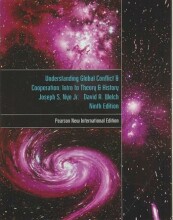Summary: Understanding Global Conflict And Cooperation An Introduction To Theory And History | 9781292023182 | Joseph S Nye
- This + 400k other summaries
- A unique study and practice tool
- Never study anything twice again
- Get the grades you hope for
- 100% sure, 100% understanding
Read the summary and the most important questions on Understanding Global Conflict and Cooperation An Introduction to Theory and History | 9781292023182 | Joseph S. Nye
-
1 Are There Enduring Logics of Cooperation in World Politics?
This is a preview. There are 15 more flashcards available for chapter 1
Show more cards here -
1.1 What is international politics?
-
What is a world imperial system?
A basic form of world government in which one government controls most of the world with which it has contact => Roman Empire -
What is the feudal system?
A basic form of world government in which human loyalties and political obligations are not fixed primarily by territorial boundaries; feodaal -
What is an anarchic system of states?
A form of world government composed of states that are relatively cohesive but with no higher government above them => today -
What are the three main differences between domestic and international politics?
Domestic law is relatively clear and consistent, force plays a different role and they differ in their underlying sense of community -
What is international politics defined as?
As politics in the absence of a common sovereign or politics among entities with no ruler above them = Anarchic -> its a self - help system
Consequently, danger exists that another state may use force due to this self - help realm and because some states are stronger
- Some argue that the balance of power is usually determined by a leading (or hegemonic) state -
1.1.1 Differing views on anarchic politics
This is a preview. There are 3 more flashcards available for chapter 1.1.1
Show more cards here -
What is the most-heared critic on realists by liberals?
It misses the growth of economic interdependence and the evolution of a transnational global society -
What is the dependency theory?
The prediction that the wealthy countries in the centre of the global marketplace will control and hold back poorer countries on the periphery -
What is the realism view on anarchy?
As thedominant theory that sees war and the use of force as the central problem ofinternational politics, and the centralactors are individual states
- They are pessimistic and stress continuity, the central problem of international politics is war and the use of force, and states as central actors
- International politics is about protecting the state from others
- Liberalist overstate the difference between domestic and international politics
- Keep armies even in times of peace -
What do constructivists think of IR?
Liberalism and realism both fail to explain long-term changed the emphasize the importance of ideas and culture in shaping international politics -
What is liberalism in terms of international politics? View on anarchy
They see a global society thatfunctions alongside states and sets an important part of thecontext for state action with a lot ofcooperation and liberty
- More optimistic and stress change
- They argue that nature of international politics is changing, the differences between domestic and international politics will blur
- Realists focus too much on extreme situaties, underestimate the importance of such things as growth of economic interdependece and the evolution of transnational global society, powerful forces for peace
- Higher grades + faster learning
- Never study anything twice
- 100% sure, 100% understanding
Topics related to Summary: Understanding Global Conflict And Cooperation An Introduction To Theory And History
-
Are There Enduring Logics of Cooperation in World Politics?
-
Explaining conflict and cooperation: tools and techniques of the trade
-
From Westphalia to World War I
-
The Failure of Collective Security and World War II - The rise and fall of collective security
-
The Failure of Collective Security and World War II - The origins of World War II
-
The Cold War - Explaining the Cold War - Three Approaches
-
The Cold War - Explaining the Cold War - Phases of the conflict
-
The Cold War - Explaining the Cold War - Levels of analysis
-
The Cold War - The rest of the Cold War - The End of the Cold War
-
Post-Cold War Cooperation, Conflict, Flashpoints - Managing Conflict - International Law and Organization
-
Post-Cold War Cooperation, Conflict, Flashpoints - Managing Conflict - The United Nations: Collective Security and Peacekeeping
-
Post-Cold War Cooperation, Conflict, Flashpoints - Instrastate Conflict
-
Post-Cold War Cooperation, Conflict, Flashpoints - Interstate conflict: current flashpoints
-
Globalization and Interdependence - The concept of interdependence
-
The Information Revolution and Transnational Actors - Power and the Information Revolution: From the Invention of Writing to the Arab Spring
-
The Information Revolution and Transnational Actors - Transnational Actors
-
What Can We Expect in the Future? - Alternative visions

































